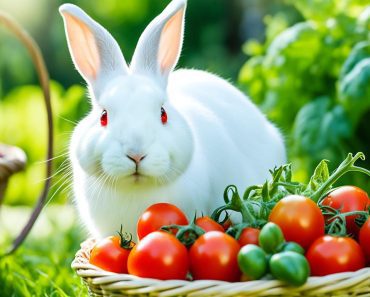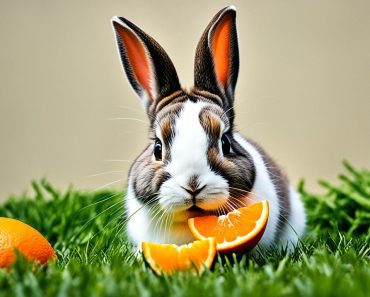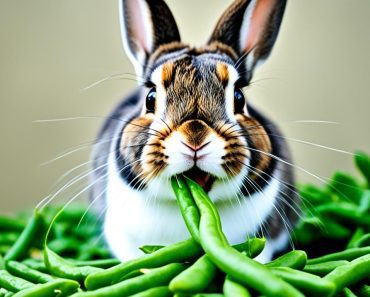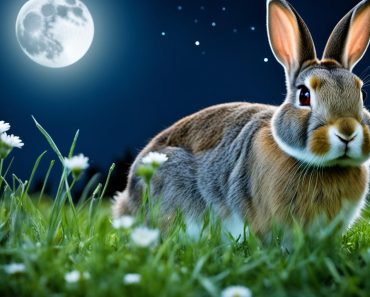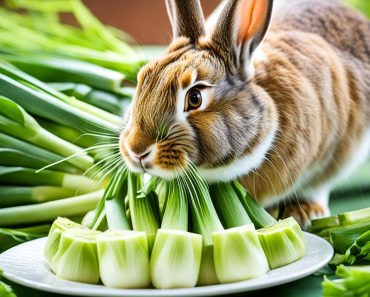Hi there, fellow rabbit lovers! Have you ever wondered: can rabbits eat squash? Well, I’m here to solve the mystery for you. So, grab a cup of tea and let’s explore the world of rabbits and squash together!
As an avid bunny enthusiast, I understand the importance of providing our fluffy friends with a healthy and balanced diet. Rabbits love munching on greens, and it’s crucial to ensure they get the right vegetables for their well-being. But can they enjoy the deliciousness of squash as well?
The good news is that rabbits can indeed eat squash, but with a few precautions. Squash is safe for rabbits and not toxic to them. However, moderation is key when it comes to serving squash to our furry companions. Overindulgence can lead to health problems like obesity, tooth decay, and digestive upset.
So, let’s dive deeper into this topic and uncover everything you need to know about rabbits and squash. Together, we’ll explore the types of squash that rabbits can eat, the potential risks involved, the benefits of incorporating squash into their diet, and how to serve it safely to our hopping pals.
Can Rabbits Eat Squash? Yes, it is safe and nutritious.
- Rabbits can eat squash in moderation, but excessive consumption can lead to health issues.
- Both summer and winter squash varieties are safe for rabbits to enjoy.
- Feeding too much squash to rabbits can cause obesity, tooth decay, and digestive problems.
- Squash can provide some benefits, such as being a source of vitamins and environmental enrichment.
- When serving squash to rabbits, it’s essential to take precautions to prevent choking and overfeeding.
Can Rabbits Eat Summer and Winter Squash?
Rabbits can enjoy both summer and winter squash as part of their diet. Summer squashes, such as zucchini and curly tromboncini, are packed with water and have fewer calories, less fiber, and less starch. On the other hand, winter squashes like butternut, acorn, and kabocha have less water content, more calories, higher fiber, and more starch.
Both types of squash are low in fat but rich in vitamins C and B6. It’s worth noting that rabbits may have a natural preference for the sweet taste of winter squashes due to their innate inclination toward energy-dense foods.
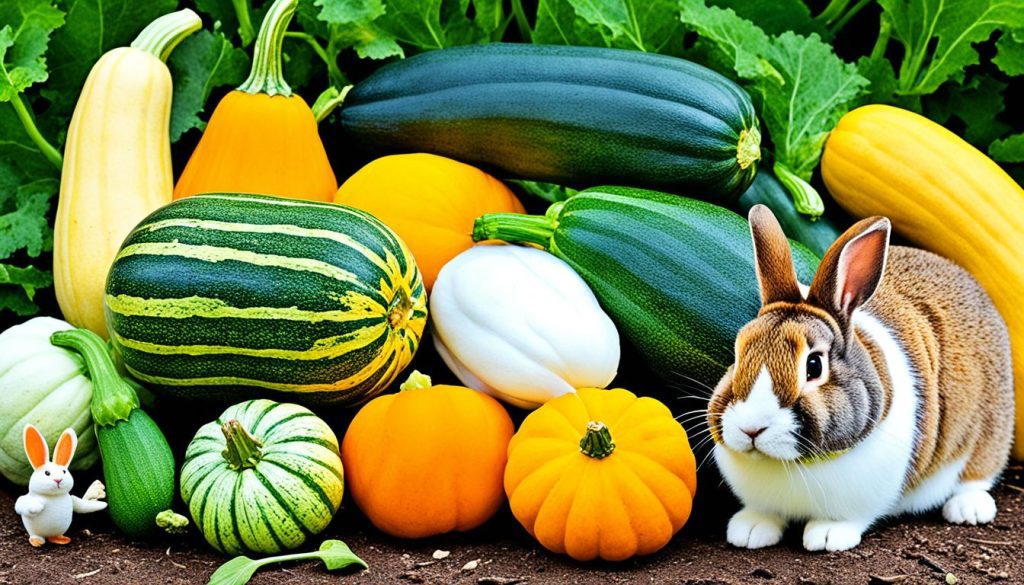
Summer squash varieties, with their higher water content, are great for keeping your rabbit hydrated. These types of squash can be a refreshing and hydrating snack during warmer months.
On the other hand, winter squashes, with their denser texture, provide more fiber and help promote healthy digestion for your furry friend.
Potential Risks of Feeding Squash to Rabbits
Feeding too much squash to rabbits can pose various health risks. These include obesity, tooth decay, and digestive upset. As herbivores, rabbits are adapted to a high-fiber, low-nutrient diet. When squash is over-consumed and replaces a significant portion of their hay diet, rabbits can consume an excessive amount of calories, leading to weight gain and potential obesity issues.
Squash, especially the winter varieties, contains a high amount of sugar. This sugar content can contribute to the buildup of plaque, tooth decay, and even gum disease in rabbits if they consume squash excessively. Additionally, rabbits may experience digestive upset when they consume excessive amounts of starchy carbohydrates and sugars found in squash.
It is essential to be mindful of the quantity of squash provided to rabbits to avoid these health problems. While squash can be a tasty and nutritious treat, it should be served in moderation to ensure rabbits maintain a balanced diet and prevent the development of these potential risks.
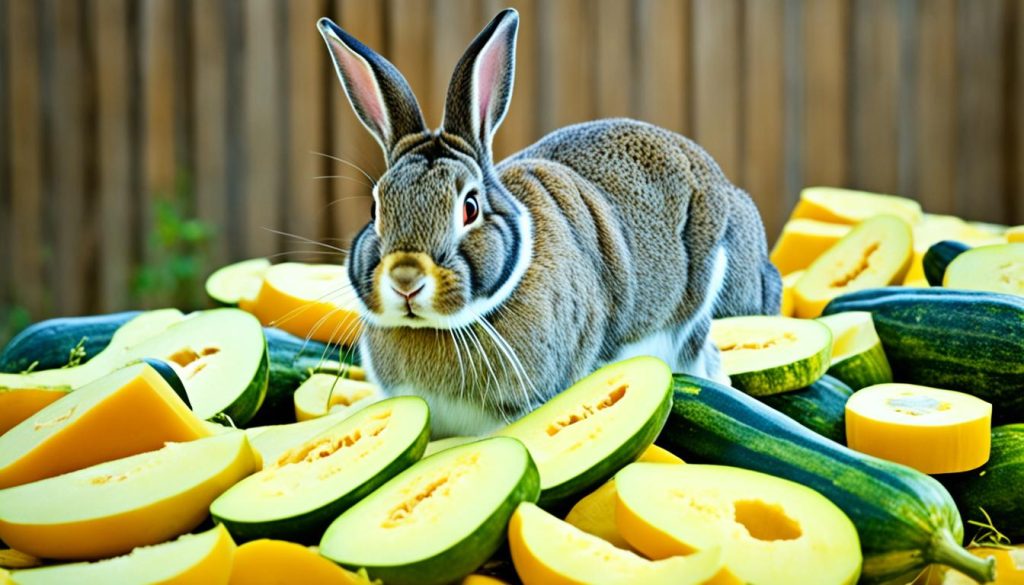
Benefits of Serving Squash to Rabbits
Squash may not be nutritionally essential for rabbits, but it can offer some benefits in moderation. One of the notable advantages of squash is its high vitamin C content, which is important for humans but less significant for rabbits since they can produce their own vitamin C. However, serving squash to rabbits can be a valuable part of their environmental enrichment, promoting their overall well-being.
Utilizing squash in various ways can stimulate natural foraging behaviors and mental stimulation in rabbits. For instance, incorporating squash into food puzzles can challenge their problem-solving abilities and engage their foraging instincts. Hiding small pieces of squash in toys can provide rabbits with an exciting and rewarding experience, encouraging them to explore and stay active. Additionally, using squash as a training treat can be an effective way to reinforce positive behaviors while providing them with a nutritious snack.
Serving Squash Safely to Rabbits
When serving squash to rabbits, it’s important to take precautions to ensure their safety and well-being. Follow these guidelines to serve squash to rabbits in a way that minimizes the risk of choking and prevents overfeeding.
Preparation Methods for Serving Squash to Rabbits
Chopping squash into matchsticks or shaving it into ribbons can make it easier for rabbits to eat and reduce the risk of choking. This helps to ensure that the squash is in manageable pieces that rabbits can safely consume.
Safe Serving Sizes for Squash
When offering squash to your rabbits, limit each serving to just one or two matchsticks or ribbons. This helps to prevent overfeeding, as serving sizes should be small to avoid any potential digestive issues associated with consuming large amounts of squash.
“Serving squash in small, occasional quantities as a treat is the safest approach.”
By providing squash in small servings, you can ensure that rabbits receive the nutritional benefits without any negative consequences.
In the title of H2 and Table, there should be no “Section:” or “Table:”, only clean, beautiful names.
Conclusion
Squash can be a safe and enjoyable treat for rabbits when served in moderation. While it may not be nutritionally essential for their diet, incorporating squash into environmental enrichment activities can provide mental stimulation and improve their overall well-being.
It’s important to be mindful of the potential risks of feeding too much squash to rabbits. Overfeeding can lead to issues like obesity and tooth decay. Rabbits are adapted to a high-fiber, low-nutrient diet, so it’s crucial to balance their intake of squash with other healthy foods.
By following safe serving guidelines and considering your rabbit’s unique preferences, you can provide them with a varied and balanced diet. Serving squash in small, occasional quantities as a treat is the safest approach. Additionally, you can use squash as part of environmental enrichment, such as hiding it in toys or using it for food puzzles, to stimulate natural foraging behaviors and mental stimulation for your rabbit.


